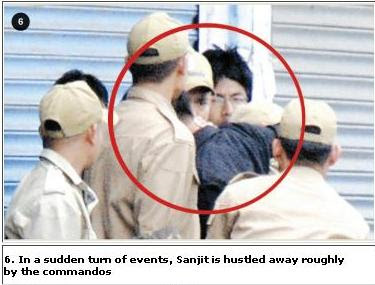
Times of India - 27/8/09
The DUSU (Delhi University Student Union) elections have been announced, and it’s that time of the year again when Delhi University’s top wannabe political honchos compete for the prize of who gets to pull the strings of power on campus. DT brings you the intrigue, scheming, politics and power play from behind the scenes:
- Pretty & Pimped
Notice how all the faces on the posters are well nigh flawless? The parties look for an attractive face, preferably a female’s. Also, to rephrase Rakhi Sawant, ‘Jo bhagwan nahin deta, woh photoshop de deta hai!’ The candidates’ photos are airbrushed to look good. It’s not possible for the candidate to meet everyone in the Univ, so it’s the face that gets the votes. “I asked a senior who he’d vote for, and he replied, ‘Jo sundar ho woh.’ I think I’ll do the same!” says first year student Ranvijay Mahla. And by the way, the Lygndoh Committee’s guideline prohibiting the use of printed posters and pamphlets unless handmade, can go take a hike!
- Keep ‘em happy
It’s also important to let students know that you’ll keep them happy. So it’s free trips to Fun and Food Village, free movies, and free lunches in the college canteen. Richa Jha, a third year student of Satyawati College, says, “Students were given free trips to Fun and Food Village
and free lunches.”
At nights, crates of booze are sent to the boys’ hostels and sometimes even the candidates are present. An insider confirms, “The leader of the group is called and the booze is given to him. It’s important to have the leaders on your side.”
- What’s in a name? lots!
It’s all about where your name appears on the EVM. Buzz has it that voters who don’t know whom to vote for usually press the first button, and some candidates take this pretty seriously. An extra A or AA added before their name ensures that they enjoy the top spot on the ballot list. An insider confirms, “AA Deepak Chaudhary, AA Rohit Chaudhary, etc, are all names just for the elections!”
- Outside help
Every year, some major parties get about 2000 outsiders to help them in the elections. A veteran DUSU leader says, “One has to make the most of these ten days. The parties get people from other states. These people help cover the vast DU campus. Jeeps, cars, etc, are hired to ferry around these ‘supporters’ and the publicity material. The candidate should be followed by cars and supporters, it looks impressive.” But don’t the Lyngdoh Committee guidelines forbid the use of vehicles?
- Bring in the moolah
Contesting an election needs big bucks. A li’l birdy tells us that a candidate from a major party needs at least Rs 10 lakhs to get noticed, not to mention a few lakhs more from the party and some from supporters, to keep going. The petrol alone costs more than 10,000 bucks. The Lyngdoh Committee’s guidelines, on the other hand, limit maximum expenditure per candidate to Rs 5000.
- Power show
To get an election ticket, a candidate has to prove to the party that he enjoys campus-wide support and influence, for which a display of strength or, in DU lingo, a ‘shakti pradarshan’ is organised. The ‘supporters’ there are DU students, IP students, people from different states and professions and some who join the crowd for money. The candidates travel through the campus with their entourage, who shout slogans, throw pamphlets in the air, and wave banners; dhols and whistles complete the show.
- Campaign capers
Once the nominations have been filed, the campaigning begins. With each candidate vying for visibility, a fight for space ensues. You paste your posters, others paste theirs, so what do you do to have an edge? Tear those of the others and put yours up there. An ex-chhatra neta gives us the lowdown – “The real campaigning happens at night. The supporters of the candidate get into cars; one car carries posters, another carries the gang of students who will tear the other party’s posters, and a third has mazdoors who will paste theirs. Also, the boys who tear the posters have to have brawn. One more car carries laths (bamboo sticks) that are made to order from Chandni Chowk.” Why, you ask? “When you tear posters, the other party’s members might spot you and then there’s always the chance of a fight.” Sometimes, the palms of the police have to be greased, so that they don’t stop you from pasting posters on any but the ‘democracy’ walls. Once this tearing, pasting, retearing and re-pasting has gone on for a couple of days, the parties reach an agreement. The posters at unauthorised places can be managed later by either paying the fine or like some netas, attending the court cases filed by MCD. And thus, the dance of democracy goes on in DU!



















